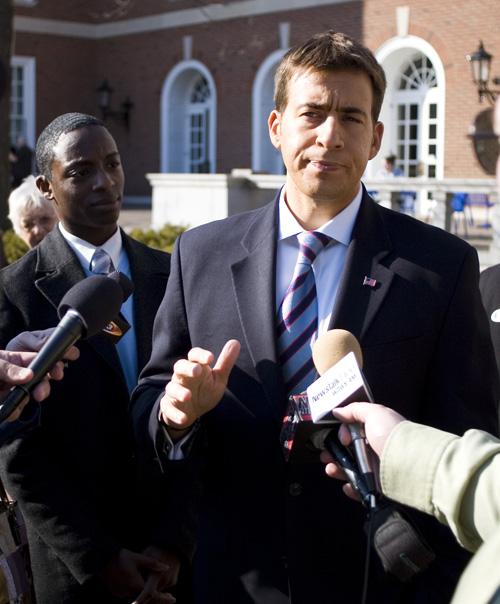Giannoulias promotes credit card reform
Illinois State Treasurer Alexi Giannoulias answers a question from a faculty member outside the Illini Union on Wednesday. Giannoulias supports a bill that would ban credit issuers from marketing credit cards with free gifts. Ned Mulka
March 5, 2009
Illinois State Treasurer Alexi Giannoulias visited campus and joined with members of the Illinois Student Senate Wednesday to solicit college students to sign a petition in support of responsible credit card marketing.
The Illinois Student Senate invited Giannoulias to campus after learning he had proposed legislation to restrict credit card marketing on all Illinois campuses.
“Our legislation will make any free gifts illegal on campus,” Giannoulias said. “This is an important issue, which is why we’re here.”
A U.S. Public Interest Research Group report published in March 2008 found that nearly two-thirds of college undergraduates have a credit card. In addition, seniors reported credit card debt averaging $2,623, more than two times the average debt of $1,301 that freshman reported.
In the same survey, students reported receiving an average of five credit card offers through the mail each month.
Get The Daily Illini in your inbox!
“Since freshman year, credit card companies have solicited students to sign up for credit cards by offering incentives,” said Vikram Chaudhery, vice president external of the student senate. “Just because it isn’t illegal doesn’t mean it is a policy that shouldn’t be changed.”
The bill will also block the selling or transferring of student names and personal information, and require financial literacy education for freshman if undergraduates are the target of marketing or advertising on campus. Companies that violate any of these provisions would face a misdemeanor charge and fine of up to $1,000.
Giannoulias stressed this new legislation would not prohibit students from applying for credit cards or building good credit.
The student activists distributed booklets to educate students about hidden fees.
“Students are not irresponsible but they may be naive about the extent of the consequences when signing up for credit cards on campus,” Chaudhery said. “The best time to enact these policies is while we are creating awareness on campus.”
The booklets addressed issues such as low ‘teaser rates,’ product rewards and discounts, as well as ‘freebies’ that credit card companies usually promote on college campuses.
The booklets also suggested shopping around before getting a credit card, using credit cards sparingly, paying balances in full each month, making payments as early as possible, asking for a lower interest rate and filing complaints about unfair credit card practices to the Attorney General’s office.
“I came to meet the State Treasurer Alexi Giannoulias to hear what he had to say,” said Michael Ori, senior in LAS. “Because our economy got to the state it’s in by spending more than we had, I think this is a very important issue to address on campus.”







